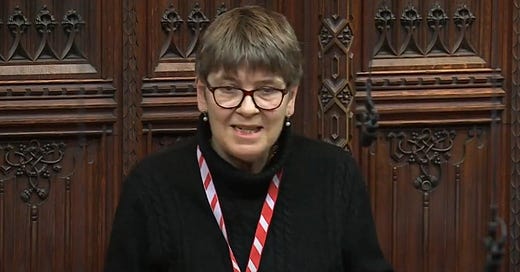Inside The Lords: assisted dying, mental health orders and other moral conundrums
Claire Fox takes us through a busy week in parliament, from the passing of the Assisted Dying Bill to rows over trans police officers strip-searching women.
Inside the Lords has been especially busy. On Friday, parliament made a historic decision with the passing of the Assisted Dying Bill. I watched from the Commons balcony. For many, it heralded an important step forward for individual freedom, to choose for themselves the time and manner of their death. In this view, passing the Bill was a humane act to alleviate suffering.
I am, however, much more concerned that it opens the door to a dangerous indifference both to the state’s power as well as society abandoning those who are suffering and dying, by affirming their darkest despair. What struck me in the debate was that, while there were very many passionate and fine speeches, they bore little relation to what this particular legislation would allow. Harrowing stories on both sides of the argument were moving, and yet somehow the principles - and what is more, the material realities - became obscured by all the emotion. An article in The Times yesterday by Lord Sumption (a supporter of legalisation) eloquently discusses the fundamental issues, like balancing sanctity of life with autonomy, but also highlights many of the problems with the current Bill.
Regardless of where you stand, state-mandated, NHS-endorsed death warrants – even if freely chosen – will create a profound change in society. When the Bill gets to the Lords, probably next summer, I will do my best to ensure the most egregious aspects of the law are amended. Without rehearsing all the arguments again, here is my short interview with Together’s Alan Miller the day before the vote:
And you can watch below as my colleague Jacob Reynolds joins the discussion of the Bill on The Spiked Podcast:
One concern is how any law that is justified by allowing those suffering terribly to terminate their lives will be restricted to those who have been told they have six months or less to live. For example, some terminally ill people who are suffering are not expected to die within six months - indeed, some people in extreme pain are not terminally ill at all. Surely those suffering intense mental anguish will demand parity of rights, as has happened in other jurisdictions.
On that issue, a momentous new law started life in the Lords this week – the Mental Health Bill. The focus of this long-awaited legislation is to reform the right of the state to detain mentally ill people against their will – that is, recognising that sectioning someone should be a very last resort. I used my second-reading speech to talk about my qualms about the Bill’s squeamishness in abolishing Community Treatment Orders. Despite widespread acknowledgement of their draconian nature, with no evidence that they work, the Bill still allows indefinite CTOs to be issued, even when a patient is being discharged from a compulsory hospital stay. I also raised the issue of IPP (Imprisonment for Public Protection) prisoners – a group I continue to campaign around. They are often denied parole because they have become mentally ill, often due to the impact of this now-abolished indefinite sentence.
Finally, I raised the problem of over-diagnosis - too many aspects of both the human condition and unpleasant challenges in life are now labelled as mental-health problems. One unintended consequence of this is that scarce resources are spread too thin to focus on those with the tragic blight of psychosis and mania. See my speech below – but for a more detailed reflection on many of these issues, see the Letter on Liberty - Escaping the Straitjacket of Mental Health - by Dr Ken McLaughlin, that I quote.
Another reason to be nervous about problems associated with the NHS having further coercive power, or indeed a muddled approach to diagnosis, is the mess of affirmative medical care for those experiencing gender confusion. Within various parts of the public sector, there are too many powerful voices cheerleading for this affirmative care, which often leads to irreversible medical interventions.
For example, I raised the issue of the Tavistock scandal in a speech on the politicisation of the Civil Service this week. Most of the other peers who spoke focused on political parties corrupting the impartiality of the Civil Service. To me, this misses the more insidious way that a Civil Service obsessively focused on EDI priorities can distort the advice it gives to politicians, such as the partisan way civil servants turned a blind eye to issues at the Tavistock.
I used the opportunity to have a go at those rainbow/progress lanyard-wearing mandarins, who insist on signing all their emails with their pronouns in bold, an act of passive aggressive partisanship in my view. I also credited the work of the relatively new Civil Service staff group, Sex Equality and Equity Network - SEEN - that has been subject to incredible hostility because they organise around the belief (fact) that biological sex is binary and immutable – a perfect example of how the diversity part of EDI never extends to viewpoint diversity.
On the issue of gender ideology and partisanship, there was a rather shocking exchange earlier this week when, in a short question, I asked the minister for his view on the announcement by the British Transport Police that male officers who identity as women be allowed to do intimate strip-searches of female suspects. The minister’s response didn’t even mention the police, but instead amounted to a rather aggressive tirade against those attacking trans rights, ending with a new slogan ‘trans people are people’.
These question times are supposed to be an opportunity to hold the government to account on key policies, not an excuse to effectively accuse a fellow peer of being transphobic – for having the temerity to ask a question on a newly revealed policing policy in a debate on policing policy. Neither is the minister supposed to signal that there will be no debate on a topic because he disagrees with the premise of the question.
In a nice example of solidarity, Baroness (Tina) Stowell asked a follow-up question and chided the minister for avoiding my point. And, gratifyingly, I have been continually stopped in corridors by other peers expressing their support for me. The minister even stopped me at the end of the week to apologise. Apology accepted. However, I will be writing to him asking to clarify what he - as a representative of the government - makes of the BTP’s new policy, especially as up until his reply to me, the minister had reiterated several times Labour’s commitment to tackling violence against women and girls. Is this another example of a form of two-tier policing? You can see the exchanges here:
To finish on a more positive note, one great privilege of being in the Lords is that I get invited to briefings about key issues. What an honour to attend one such event organised by For Women Scotland and their legal team, as they hotfooted from the Supreme Court to tell us their behind-the-scenes story of their historic fight to legally clarify the definition of a woman (see an official write up here) and Hannah Barnes’s reflections here. If you don’t follow them on X already, please do - see this thread. So, I couldn’t have been prouder to have had my photo taken with one of the For Women Scotland’s warriors, Marion Calder, who has been a stalwart supporter of our Battle of Ideas festival over the years and has proved that she is someone who is brave enough to lead key battles for women’s rights. Good one Marion.




